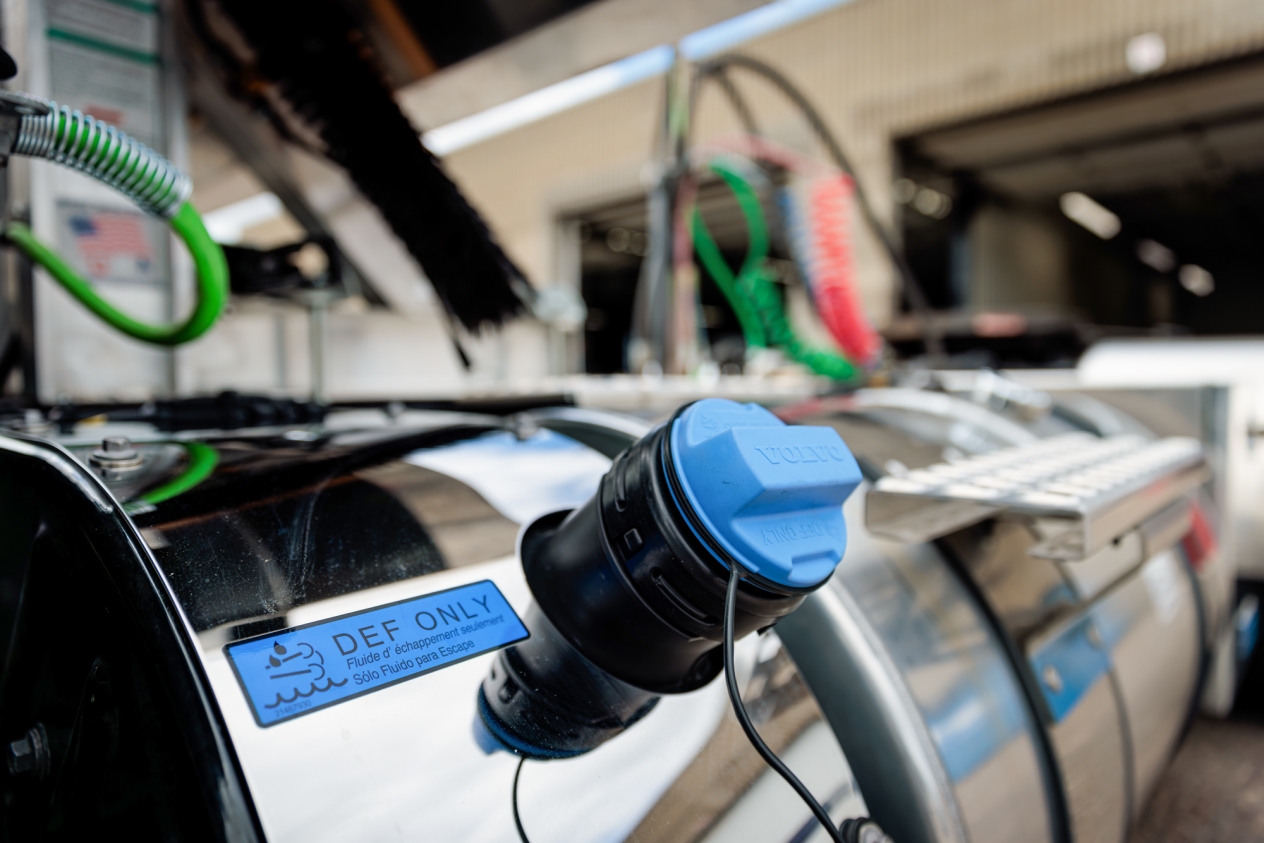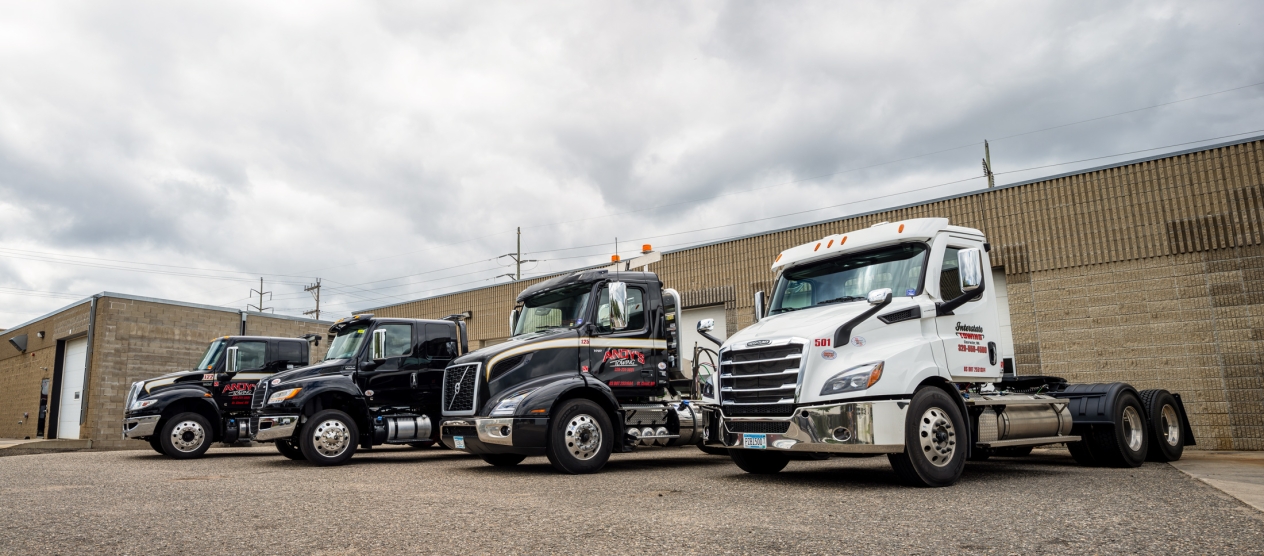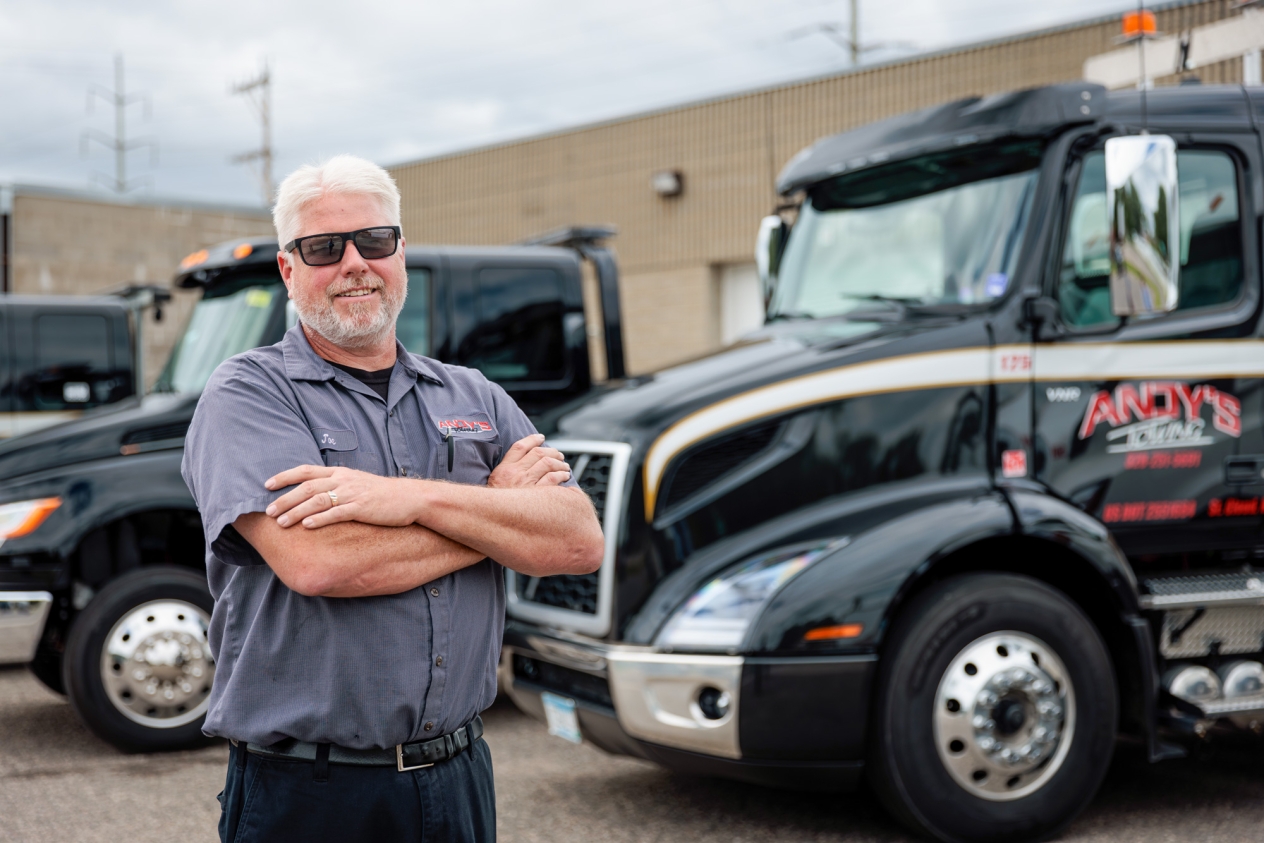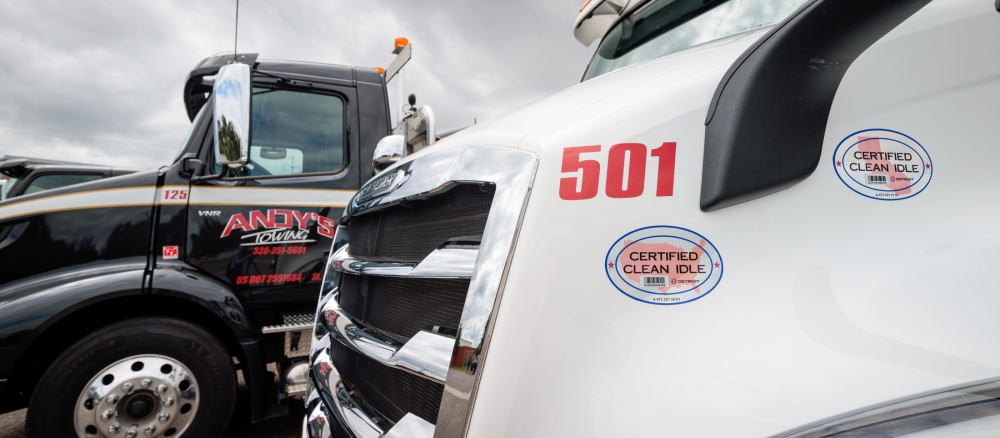Nobody likes being on the end of a tow hook, but now people in St. Cloud can at least breathe easier in that situation
When Joe Kampa bought Andy’s Towing in St. Cloud about 10 years ago, the business came with about three dozen trucks of all sizes, from lighter-duty duallies that tow broken-down cars all the way up to massive 75-ton rigs capable of righting semis that have rolled over into ditches.
Investment in the business had dropped off before he bought it, though, so the fleet of trucks was showing its age. Not a single one of them came anywhere close to meeting emissions standards for new heavy-duty diesel trucks.
“We really struggled with making the leap to newer, cleaner trucks,” Kampa says. He initially resorted to replacing some of the trucks with other pre-emission trucks just to keep the fleet on the road but knew he had to modernize the fleet at some point.
So Kampa leaned into a couple of grants from the MPCA — funded by the money that Minnesota received in the Volkswagen diesel emissions cheating settlement — to replace a total of seven of the business’s trucks with cleaner, more modern diesel engines.
“Those grants gave us the opportunity to take a chance on buying these new trucks,” Kampa says.
Just as they did for many other heavy-duty truck operators across the state who needed help replacing their older diesel trucks and buses with cleaner working rigs.
Why new diesels pollute less
The benefits of switching to newer heavy-duty on-road trucks, at least in terms of emissions reduction, are clear. Any new heavy-duty truck built since 2010 must meet strict federal emissions standards for nitrogen oxides and particulate matter.
Diesel engine manufacturers have responded with an array of emission control devices, including exhaust gas recirculation systems, diesel particulate filters, and systems that use diesel exhaust fluid — found in those blue bottles often on prominent display at truck stops nowadays — to convert nitrogen oxides into simple nitrogen and water vapor.

The emissions equipment works too. As Lexie Lyng, the MPCA’s electric vehicle program administrator, noted, nitrogen oxide emissions for a typical diesel-powered box truck have dropped drastically from 15 grams per mile in 1998 to 3.9 grams per mile in 2007 to 0.9 grams per mile in 2020.
“At its heart, the Volkswagen fund really is a nitrogen oxide reduction program,” Lyng says.
Both nitrogen oxides (a category that includes the pollutant nitrogen dioxide) and particulate matter can harm human health, particularly the lungs and respiratory system. In addition, nitrogen oxides, which are created by burning fuels at high heat, can create other hazards like ground-level ozone when they react with chemicals in the air. The U.S. Environmental Protection Agency classifies nitrogen dioxide and particulate matter — as well as ground-level ozone — as criteria air pollutants for which it sets standards to protect human health and the environment.
Breaking down the cost barrier
The cost of a new heavy-duty truck, however, can be prohibitive for a lot of business owners. A new International MV rollback truck, for instance, can cost $150,000 or more, depending on how it’s outfitted.
As a result, Kampa says, some business owners opt to buy secondhand trucks that may pollute more than a new truck or try to keep their existing fleet on the road for as long as possible.
“Not everybody’s in a position to buy a new truck,” he says.

Andy’s Towing, on the other hand, is. The business runs a sizeable fleet that’s constantly on the move, often traveling to the Twin Cities metro area. The frequent dispatching of tow trucks from the company’s shop on St. Cloud’s industrial east side resembles the pollen-gathering flights from a beehive amid a field of flowers in full bloom.
With an app on his phone, Kampa can quickly look up the service records of every truck in his fleet and keep a close watch on each truck’s age and mileage.
“My goal is a turnover rate of every five years for the light-duty trucks, 10 years for the heavy-duty trucks,” he says.
To help meet that goal, he applied to two grants from the Volkswagen settlement focused on clean heavy-duty on-road vehicles. The first, in 2019, distributed nearly $3.7 million to 29 truck operators across the state to replace 116 diesel trucks. Of that total, Andy’s Towing received $71,895 to replace two older trucks.
The second, in 2023, distributed nearly $2 million to 12 truck operators to replace 39 diesel trucks. Of that total, Andy’s Towing received more than $290,000 to replace five trucks.
“It’s a great program and helped us out quite a bit,” Kampa said.
Clean diesels provide bang for the buck
When German carmaker Volkswagen agreed to pay up to $14.7 billion to settle allegations of cheating on diesel emissions tests, the portion of that money that Minnesota received — $47 million — came with the stipulation that it could only be used in two ways: to install electric vehicle charging stations and to replace older diesel vehicles with newer, cleaner models.
The stipulation didn’t say what the newer, cleaner models had to be powered by, and the MPCA grants distributing those Volkswagen settlement funds — including the current round of grants — have made it possible for truck and bus operators to purchase electric, diesel-electric hybrid, propane, and natural gas vehicles.
The most “bang for the buck,” however, comes in the form of clean diesel trucks, according to Evan Pak, a mobile source emissions reduction specialist with the MPCA.
“While electric vehicles do emit fewer tailpipe emissions than even new diesels, electrics are far more expensive, so we can only fund so many of them,” Pak says. “With the same amount of funds, we can fund so many more clean diesel purchases.”
And as Kampa explains, because the heavy-duty truck industry has been dominated for so long by diesels capable of generating massive amounts of power, owners and operators are slow to switch to the heavy-duty electric trucks now hitting the market.

“I’d be curious about electrics, and I think a tow truck could be a good option for electrics with their short, in-town trips and plenty of downtime for charging,” Kampa says. “But the demand for hydraulic power is still the biggest problem to overcome. The batteries just can’t keep up with it.”
Lyng says that natural gas and propane-powered trucks could be a good option for any truck owner or operator not yet ready to switch to electric trucks.
“They’re still a really good deal, and people who run those trucks usually have their own infrastructure to fuel them,” she says.
Even without many takers for electric trucks and other diesel alternatives, the MPCA’s heavy-duty truck grants have led to significant reductions in pollutants. Combined, the two grants led to a reduction of 422 tons of nitrogen oxides, 20 tons of particulate matter, and 16,402 tons of greenhouse gases, or about the same impact to the environment as removing more than 27,000 cars from the road for a year.
So far, all MPCA grants funded by the Volkswagen settlement have led to the reduction of 2,500 tons of nitrogen oxides, 275 tons of particulate matter, and more than 78,000 tons of greenhouse gases, the equivalent of taking 160,000 cars off the road for a year.
More work to be done
As with the prior two grant rounds, this third and final round of MPCA heavy-duty on-road truck grants from the Volkswagen settlement is open to businesses, nonprofits, individuals, and public entities that operate Class 4 to Class 8 trucks and buses primarily in Minnesota. The replacement vehicles must be 2023 or newer and must be used for a similar purpose as the vehicles they’re replacing. The grant also requires the truck operator to destroy the engine and chassis of the vehicle being replaced.
Grants can cover up to 75 percent of a new all-electric vehicle and up to 25 percent of diesel, hybrid, natural gas, or propane vehicles. Truck owners and operators can apply for grants to replace multiple vehicles.
Kampa, who is still working on phasing out some of the pre-2010 vehicles in the fleet, says he’s certainly interested in applying for the latest grants, and he’s also told other truck owners they should apply too.
“We’ve made a lot of progress thanks to the heavy-duty truck grants,” he says. “We’ll keep doing what’s best for our community and our customers.”
Pak says he’s not certain whether the MPCA will offer similar grants in the future. The MPCA is currently in its final phase of distributing the Volkswagen settlement funds.
In addition, there are now far fewer pre-2010 diesel trucks to replace, thanks in part to these grants.

